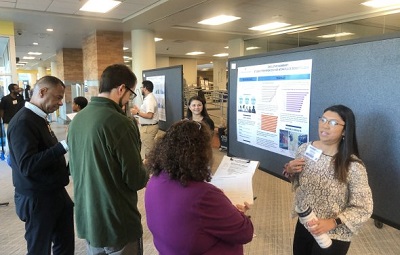Examination into the Moderating Effects of Resilience Capacity on the Relationship Between Interpersonal Trauma and Self-Medication in Black College Students
Description/Abstract/Artist Statement
Psychiatric comorbidity among individuals with posttraumatic stress disorder (PTSD) is common. A widely accepted explanation for this comorbidity is the self-medication model, which posits that individuals may engage in maladaptive behaviors (e.g., alcohol/cannabis use, binge eating) to cope with PTSD symptoms. Certain types of trauma exposure, such as interpersonal trauma (IPT; e.g., sexual/physical assault), have been shown to increase the risk for PTSD and may also increase risk for self-medication behaviors. To date, the self-medication literature has been limited to predominantly white samples, leaving a pronounced need to investigate self-medication among culturally diverse samples. The present study aimed to test associations between IPT and PTSD-related self-medication behaviors among a sample of Black participants at a large urban college campus (N=334, Mage=21.62, SD=6.08; 82% female) and to test whether resilience capacity moderated the relationship between IPT and self-medication. Results indicated that IPT was prevalent in our sample (M=9.02, SD=9.93), and was positively associated with self-medication behaviors, including trauma-related drinking to cope (TRD) (β=.235, t=4.16, pβ=.202, t=3.58, pβ=.315, t=5.72, pps>.05). These findings call for clinical intervention strategies targeting ITP exposure in college settings to mitigate self-medication behaviors and future research to explore the role of culturally relevant factors (i.e., racial identity, spiritual coping), rather than individual-level resilience, in moderating self-medication behaviors in a trauma-exposed Black sample.
Faculty Advisor/Mentor
Sage Hawn
Faculty Advisor/Mentor Department
Psychology
College Affiliation
College of Sciences
Presentation Type
Poster
Disciplines
Clinical Psychology
Session Title
Poster Session
Location
Learning Commons Lobby @ Perry Library
Start Date
3-30-2024 8:30 AM
End Date
3-30-2024 10:00 AM
Examination into the Moderating Effects of Resilience Capacity on the Relationship Between Interpersonal Trauma and Self-Medication in Black College Students
Learning Commons Lobby @ Perry Library
Psychiatric comorbidity among individuals with posttraumatic stress disorder (PTSD) is common. A widely accepted explanation for this comorbidity is the self-medication model, which posits that individuals may engage in maladaptive behaviors (e.g., alcohol/cannabis use, binge eating) to cope with PTSD symptoms. Certain types of trauma exposure, such as interpersonal trauma (IPT; e.g., sexual/physical assault), have been shown to increase the risk for PTSD and may also increase risk for self-medication behaviors. To date, the self-medication literature has been limited to predominantly white samples, leaving a pronounced need to investigate self-medication among culturally diverse samples. The present study aimed to test associations between IPT and PTSD-related self-medication behaviors among a sample of Black participants at a large urban college campus (N=334, Mage=21.62, SD=6.08; 82% female) and to test whether resilience capacity moderated the relationship between IPT and self-medication. Results indicated that IPT was prevalent in our sample (M=9.02, SD=9.93), and was positively associated with self-medication behaviors, including trauma-related drinking to cope (TRD) (β=.235, t=4.16, pβ=.202, t=3.58, pβ=.315, t=5.72, pps>.05). These findings call for clinical intervention strategies targeting ITP exposure in college settings to mitigate self-medication behaviors and future research to explore the role of culturally relevant factors (i.e., racial identity, spiritual coping), rather than individual-level resilience, in moderating self-medication behaviors in a trauma-exposed Black sample.

